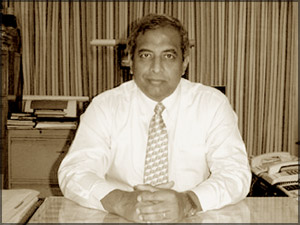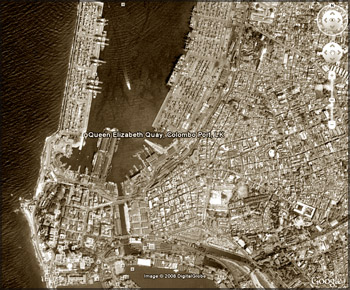|
Significant role of Sri Lanka Customs in a changing
world:
Customs cannot rest and wait in the face of racketeers - C. S. W.
Jayatilake Director General of Customs
By Indeewara Thilakarathne
[email protected]
In an exclusive interview with ‘Sunday Observer’ , C. S. W.
Jayatilake, Director General of Customs spells out the vital role that
Sri Lanka Customs plays as a collector of taxes and in adapting security
and protective measures at the point of export and import of goods to
the country. He also explains challenges faced by the Department in the
face of organised racketeers and cross border terrorism.
|

C. S. W. Jayatilake Director General of Customs. |
Q: With increasing smuggling of goods into the country by
illegal means and organized racketeers coming into the scene in a big
manner, can the Department of Customs single handedly deal with these
issues with its present human and physical resources?
A: well, it is a challenging task. People those who are
smuggling and under valuing and involved in fraud do not rest.
Therefore, nobody can rest in this game. If you are to collect correct
revenue, it is a game between two parties. We cannot say we are fully
equipped because somebody else may create an area where they may make
money without paying tax.
One must not forget tax culture in Sri Lanka. Tax is a thing that
nobody wants to pay and nobody even likes to hear it. It is considered
as a penalty. If you say that you are getting into a tax nest, people
say your are bad. Paying tax is like a sin in this country. Perception
on tax payment and collection is very bad.
Q: What are the measures that the customs has taken to protect
intellectual property rights?
A: In corporate sector, large scale importers and exporters
have been regular tax payers. Another burden on the customs is to make
sure that intellectual property rights are protected. No duplicates and
substandard goods should be allowed into the country. However, in Sri
Lanka right holders do not have a say on this matter.
For instance Siedles or National, if they import business is
profitable, they are not interested in second party importing ‘National’
or ‘Notional’. Poor people who cannot read will buy goods by looking at
the lettering. There customs has a duty to protect the consumers. For
that right holders should come forward.
We are working with USAID to get assistance to set up a data base of
all the right holders, their products and their special features. These
are mainly in the areas of music CDs and Software and computer
accessories, pirated CDs. But my main concern is about Western drugs
that are imported into the country. Those drugs are without proper
qualities.
Absolutely no standards are maintained on importing of birth control
equipments and injections. No imports can be made without CDDA’s
approval. CDDA (Cosmetic Drug Device Authority) approval is given only
to registered manufacturers and registered owners of the rights or
products to import. What happened is once the product is approved, other
people import duplicates of that product manufactured in diverse
countries.
Then there is a necessity for Customs to intervene into the matter.
But customs should be supported by right holders. Duplicate products are
almost the same as the originals but substandard.
Q: Role of Sri Lanka customs is increasingly becoming vital
especially in the context of cross border terrorism, pyramid schemes and
also a main revenue collector of the government in terms of diverse
tariffs and taxes.
How do you perceive the changing face of Sri Lanka customs from
colonial day to independent Sri Lanka?
A: Basically the Department of Customs came into being as an
organization to recover taxes and control the entry /exist point of a
country. Historically speaking, colonial administration wanted to have a
Department of Customs in order to collect import and export taxes.
As it was a very important entity, Customs under the Colonial
Secretary and principle collector, at that time, was the second
important government officer who would act for the Governor when the
Governor was on leave.
Today in developed countries custom duties are not the most important
factor when it comes to tax collection.
Custom is expected to play a more protective, socially responsible
and controlling role. It is also important as an agent in imposing and
implementing international trade agreements like WTO.
In Sri Lankan context, tax revenue still remains as the major
component of government’s income and it is about 85 per cent of
government’s revenue. Out of the tax revenue, the Department of Customs
collects 55 per cent government’s revenue in terms of custom duties,
collection of VAT at the point of import, port and airport levies, CESS
and various other social responsibility levies.
However, the role of customs does not confine to tax collection.
Custom also implements tax regimes such as granting of exemptions and
granting of concessions for imports. Customs implement bi-lateral and
multi-lateral trade agreements like SAFTA, and check whether country of
origin has been observed and also address related issues.
We have array of social responsibility package on gathering
information on the one hand and prevention or enforcement of laws and
regulations of the other organizations on the other hand. There are more
than sixty odd laws and regulations we have to implement; health
related, fauna flora related, standards related, food control, exchange
control requirements, species and dangerous species and antiques related
laws and regulations.
We have recently introduced Maximum Retail Price (MRP) requirement
printing on the items like chewing gums, chocolates which are directly
consumed.
|

Aerial view of the port of Colombo |
At the time of importation MRP should be fixed on the items and the
tax has to be collected accordingly. One way local industrialists are
protected by displaying the price and on the other way, it is for the
purpose of tax collection. Customs involves in almost all the areas.
For instance, recently we examined a consignment of fresh fish
imported into the country. It was found that formalin content in the
consignment of 75 tones of fish was not suitable for human consumption.
So the customs had to call food inspectors and then we had to find a
way of disposing the consignment. Responsibility of disposing it was
entrusted to customs. These kinds of activities are not related to tax
collection. These are social protective activities.
However, detection of illegally imported cigarettes is directly
linked to tax collection. If you permit cigarettes coming into the
country or cigarettes get smuggled into the country, our revenues
generating from manufacturing of cigarettes will drastically drop.
As far back as in 2001 and 2002, eleven per cent of total cigarette
consumption was smuggled cigarettes. Now smuggled cigarettes come down
to one per cent. It is a very lucrative business and smuggler can afford
to lose even five times because cost of manufacturing a cigarette is one
rupee while it is sold in the market at 15, 17 rupees.
Highest tax revenue from cigarette
Due to the rewards given to officers, custom was able to smuggling of
cigarettes into the country. Those days we used to confiscate and give
the cigarettes to the army or have them disposed. Now, Ceylon Tobacco
Company takes the confiscated cigarette and disposes them by burning
them in a burner.
The entire process of disposing cigarettes is carried out under the
supervision of customs officials. On inquiry of a concerned citizen, we
have to send photographs of disposing cigarettes.
Our total commitment for the recovery of tax per year is 365 billion
rupees and out of that we expect around 31 million from CTC along which
is ten percent from a one company. It is more than a sum we recovered
from motor vehicle imports. |
